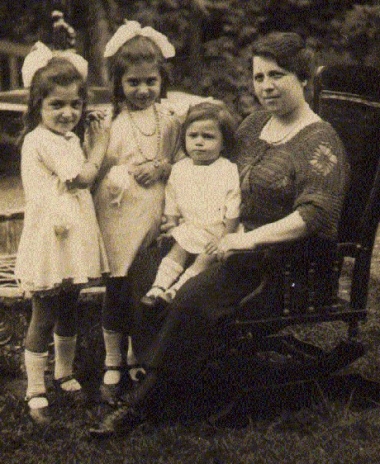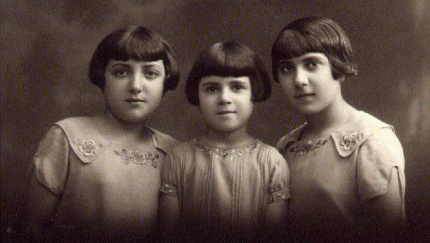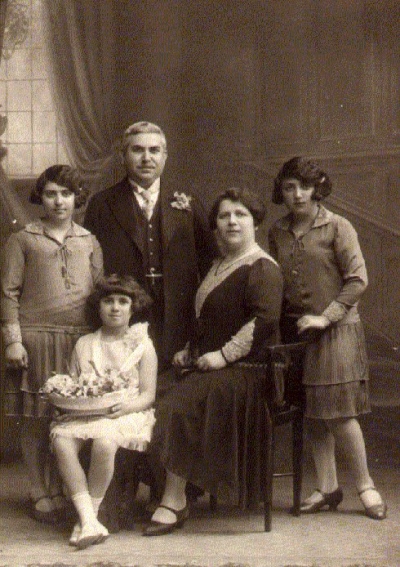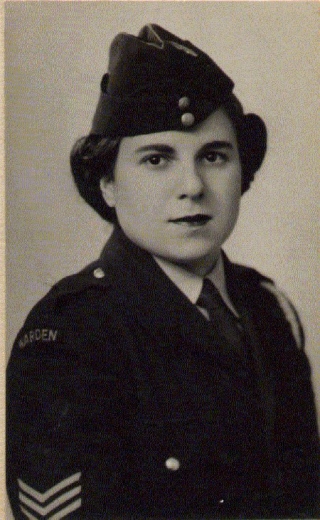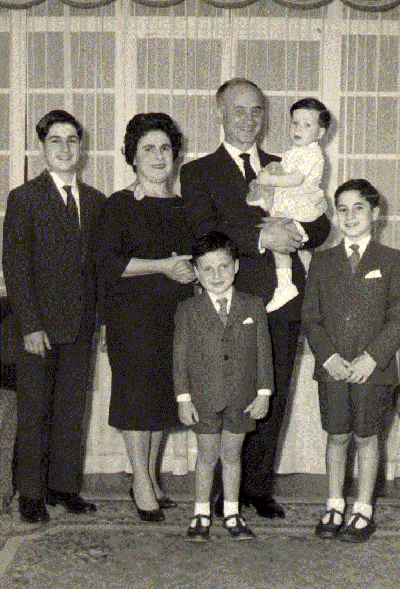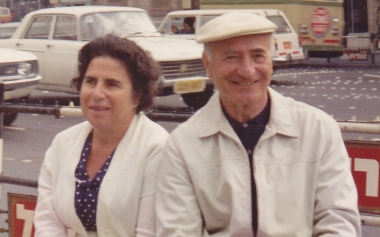|
|
|
My Mothers Story My mother told me her own story, when I interviewed her in early 2006, when she was 86 years old. It proved to be a timely interview, because within two years her health was in sharp decline and she died in 2010 at the age of 91. She spoke softly during the interview because her strength was already beginning to ebb away. She spoke modestly and without rancour. This is this story my mother told me: I was born on August 17th 1919, and given the English name Louisa, and Hebrew name Liba bat Eliyahu. I have always been called Libby, except that at school I was still Louisa. I was not a healthy child. I know that when I was young I was diagnosed with a heart murmur, and when I was about three I nearly died. Simultaneously I had come down with double pneumonia, measles and diptheria. The Lord apparently did not want to reclaim me so soon, however. I pulled through, and my parents gave me an extra name. I was now Liba Chaya bat Eliyahu Chaya meaning life. I continued to be more than usually susceptible to illnesses throughout my primary school years.
Libby aged 1, with mother and sisters My earliest memories are of being taken to my first school in Southwold Road, Clapton. Being a delicate child, I used to be taken in a pram. We lived in Clapton at the time, in a semi-detached house in the main road. When I was about six or seven, we moved to the house I was to live in for the next 23 years: 404, Seven Sisters Road, a large house on four floors, looking across to Finsbury Park. At that point, I left the Southwold Road School. Four doors away from the new house in Seven Sisters Road, there was a secretarial College called Greg's College, which trained teenage girls for their future careers. My older sisters Rose and Gertie joined the college, and Mummy persuaded the College to enrol me as well, although it was completely inappropriate for me. After a couple of weeks, my parents found me a small private school, run in a private house by a Miss Thompson. It was a strange set up - I remember that Miss Thompson used to shout at the teachers and make them wash the floors. I didn't see much of Mum and Dad except on Shabbat. During the week, they only used to arrive home from work by bus at 11 o'clock at night, because their wine shop in Commercial Road was open until 10:30. In the shop, my mother served behind the counter and was very popular; my father knew the wine trade, knew the composition of wines and liqueurs, and did the desk work for the business. So my parents were out of the house for most of the day, and we were looked after by a cook and a maid, who lived in rooms on the top floor. I and my sisters used to go to the shop on Sunday, and perhaps go along to the cinema down the road from the shop, or watch the weddings at the Philpot Street Synagogue. I was the youngest of the children Rose, born in 1915, was 4 years older than me and Gertie 2 years older than her, and those two were very close. Aaron was the oldest, nine years older than me, and was the 'grown-up', though he used to playfully fight with me on Friday nights we used to chase each other round the table. By the time I was 11, Aaron had married Sadie, but they continued to live at the house, occupying the second floor. This large house now comprised: the kitchen, dining room and front room on the ground floor, my parents' bedroom and the drawing room on the first floor, rooms for Aaron and Sadie on the second floor, and the girls' rooms and maid's and cook's rooms on the top floor.
Rose, Libby, Gertie When I had reached age 11 and it was time to switch to a secondary school, my parents wanted me to go to a free council school like my sisters. These were known to generally provide only a poor standard of education. I don't remember how the notion formed in my mind but form it did that I was going to go to the Skinners' Company School for Girls. I was not to be shaken in my resolve on this. Skinners' was a fee-paying school, though I believe it was partly funded by the Guild of Skinners, and it had a good reputation. Unfortunately my father's absent-mindedness meant that he was normally rather late in his payment of fees, and he paid scant attention to the letters to parents that I brought home. I remember going to school supplied with white gym knickers, which should have been navy. Matters like that did not seem to impinge on him. Neither of my parents knew anything about the school system and they couldn't, for example, give any help with homework Mummy couldn't read. I was a well-behaved but unremarkable student in the B-stream I used to pass my exams, though I once failed a sewing exam and I gave up sewing and housewifery as soon as I could. My favourite subjects were French and German. I
Family group around 1927: Outside of school I had also been taught Chumash (that is, Five Books of Moses) translation by a Rabbi who unforunately was rather inadequate as a teacher. I only had the benefit of a good Hebrew teacher many years later, after I married. I carried on working in the wine shop for much of the war, going to work by bus or by tram and stepping over the fire hoses in the street. At one point during the war I was called up for war work in a wood factory in Edmonton. I was drilling holes in the wood, and I found the smell of the wood shavings unbearable. I wasn't there for long. Around 1940 I volunteered to work as a part-time Civil Defence Fire Warden. I became the Senior Fire Guard of our area post A5, within Stoke Newington. Every business premises needed to appoint a Fire Guard, and they were supposed to report to me. In practice, these guards were generally older men, all volunteers, and I and a companion used to go round to see them on duty. One of the roles of the fire wardens was to learn where all the fire hydrants were, so that we could inform the Fire Service if needed. Our main duty was to patrol the streets of our area on foot. There were always at least two of us together we weren't allowed to patrol alone. If any incident occurred, we had to inform the fire or ambulance service as appropriate as to what help was needed, and lead the rescue services to the site. Another rescue service that played an important role were the teams that would dig through the debris to rescue people trapped if, for example, a building had collapsed. We didn't have radios there was just the telephone at the fire warden's post - so we had to go on foot to pass our information on. If an incident happened, we would run back to the warden's post mine was a basement room in a house and call the rescue services from there. Our area was fairly lucky, certainly in regard to the fire-bombing of the earlier part of the war. I can't recall many incidents during my time of patrolling, although I do particularly remember one night when a lot of fire bombs were dropped. But across the road from our house was Finsbury Park, which was a constant target for German bombing because anti-aircraft artillery batteries were positioned there, and tanks were being repaired at a nearby race track.
Deputy Post Warden Libby Sacks As for our house in Seven Sisters Road, it was subject to both the shock waves caused by the artillery fire from Finsbury Park and the bombing by German aircraft. The Army Authorities therefore suggested that the house be reinforced with concrete. Because of this, our friends and neighbours considered the house to be very safe. Accordingly, when the bombs were falling, lots of people would come to sleep in our basement shelter and one even slept under our dining room table. We got fed up with this and took our chances sleeping upstairs. Once the Germans started dropping the V-1 flying bombs in 1944, I switched to full-time fire warden duties, and was the Deputy Post Warden. I find it hard to remember the duties involved, but I think I was based rather more than before in the warden's post, taking and acting on the phone calls. It was in the warden's post that I learned to play table tennis! The V-2 rocket attacks began late in 1944. They flew faster than the speed of sound, which meant that, unlike with the V-1's, there was no whistle warning enabling us to take cover the whistle could only be heard after the rocket had landed. We weren't allowed to patrol once the V-2s started being fired. The V-2s caused much loss of life and damage to property. One of them fell near the home of my sister Rosie and her husband Wilfred Goldberg, and several of their neighbours were killed. Their daughter Angela, who was then 2 years old, was in the house at the time and was miraculously saved by the fact that she was sleeping in an iron cot, which prevented the roof beams from falling on top of her. I had that day gone down to Bournemouth with my mother, my first trip away for some years, and was there for one night and heard about this incident. I came back to London that day and brought Rosie and Angela back down to Bournemouth. During the war, shadchans matchmakers used to come to the shop offering shidduchim for the supposedly eligible Frumkin girls. My parents' aspirations were straight out of "Fiddler on the Roof" "For Papa, make him a scholar; for Mama, make him rich as a king " In reality, most of the men who were available were those who were too unhealthy for military service, and they were best avoided. Dayan Grunfeld once brought Immanuel Jakobovits as a possible match but I did not want to marry a rabbi, and so I scared him off by smoking. A shadchan once tried to match me up with a man who turned out to be a confidence trickster. I was furious with the shadchan.
Family at time of Jonathan's Barmitzvah, 1961 During the war we hadn't been aware of the extent of the Holocaust, although we knew that terrible events were taking place. I recall that someone visited us from Poland and told us that she had seen my mother's sister and her family taken away in a lorry. In 1946, the same shadchan that had disappointed previously told Annie Sacks to come to the shop to check me out. She did, and told her son Louis to ring me up. As they say, the rest is history Louis and I married in September 1946. Louis had served in the Royal Air Force in an administrative capacity for several years during the war, and had been awarded a campaign medal. For many years afterwards, he and I used to march together on the Jewish Armistice Day, the week after the National Armistice Day. Once we married, we lived in the house in Seven Sisters Road for nearly four years. I think that Louis coped with the lack of privacy by going upstairs to our room to read and to listen to music on the gramophone. On June 20th 1950, by which time Jonathan was two years old, we moved to our new house in Rathgar Close, Finchley. We were now a small nuclear family and life was quieter. I finally engaged a good Hebrew teacher for myself, and a neighbour, Mrs Simmonds, introduced me to bridge, which I have played with a group of friends ever since. I gave birth to my four children, all boys, at four year intervals. I was a bit disappointed that I never had a girl, but I got over this setback. My obstetrician for Jonathan was Sir John Peel, the Queen's obstetrician, and I was also a private patient when I had Brian at the London Hospital in Stepney. I gave birth to Alan and Eliot in Hampstead, under the National Health Service. I've never really thought about whether bringing up the children was different from what I had expected. Perhaps it is a good thing that I don't remember all that well. For example, I don't remember the boys fighting a lot (!). Ada has been part of the family since 1954, and she helped enormously at home with the children.
Libby and Louis in Israel around 1970 Yet another activity I carried out for 35 years was visiting the Jewish patients at the Whittington Hospital in Highgate. I was appointed as a visitor in June 1966, under the auspices of the Jewish Visitation Committee. I generally found that the patients were very pleased to be visited, and they wanted to chat. Both the hospital and the Visitation Committee made presentations to congratulate and thank me for 35 years' visiting it was very touching but really unnecessary. How has my life changed as a result of Jonathan becoming Chief Rabbi? Not one bit. |
|||||||||||||||||||||
|
|
|||||||||||||||||||||
